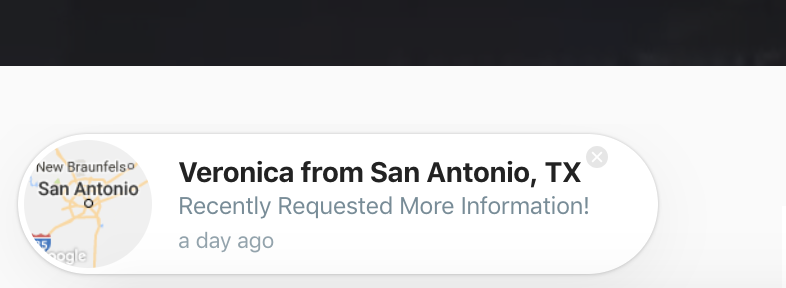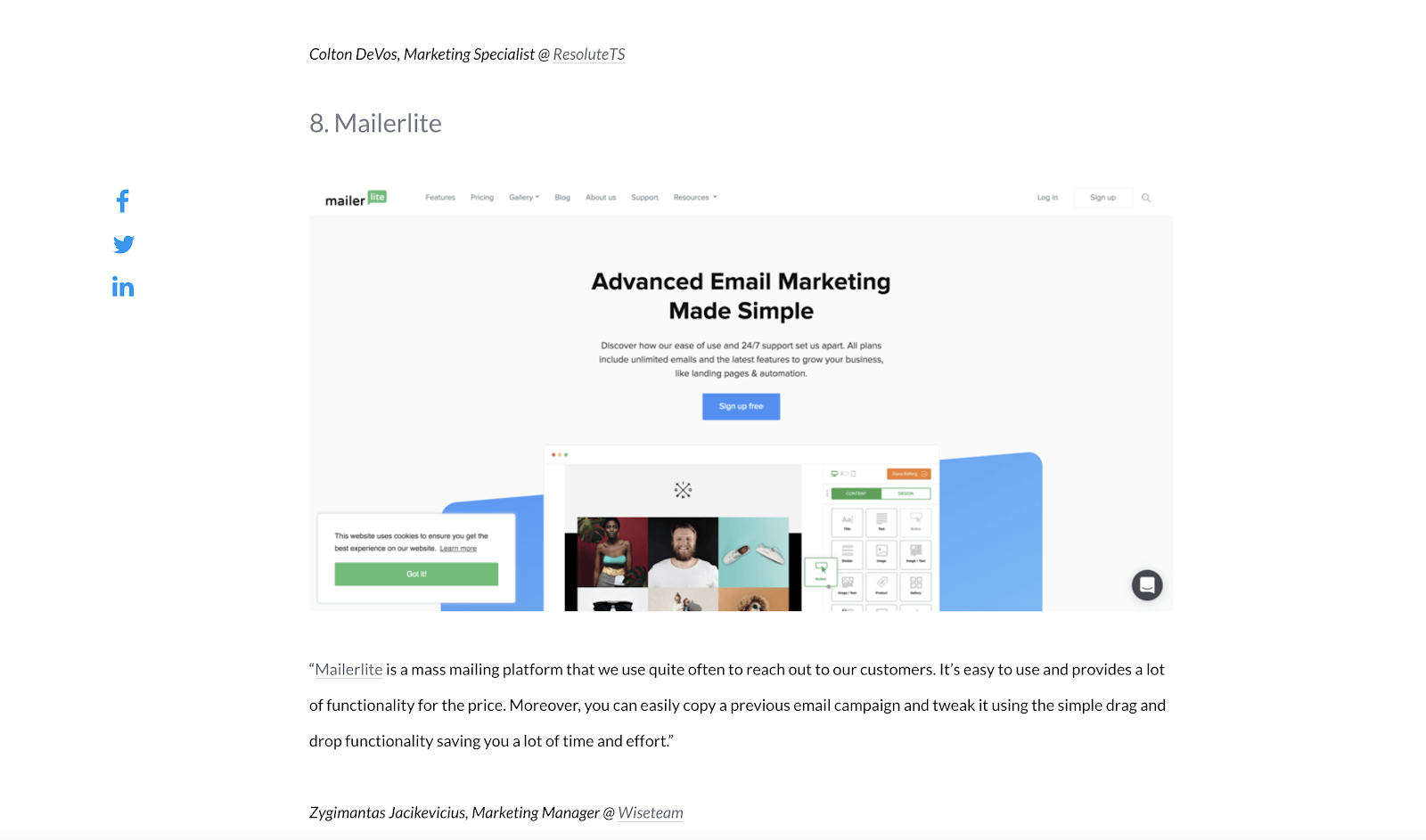
Content Crafters is an interview series where we de-construct the tools, tips, and tactics that top bloggers use to get so much work done. you’ll walk away in mere minutes with actionable takeaways you can try out right away. Let’s dive in!
Ben Johnson is the Content Strategist at Proof, Y-Combinator backed SaaS company based in Austin, Texas. The company makes social proof software, helping companies increase their conversion rates.
Previous to that, Ben worked on launching UberEATs in Austin, and later on content at Fundera, a NYC-based FinTech marketplace for small business loans. Prior to that, he had launched his own successful online business, selling flash tattoos to sororities. He’s an experienced startup marketer and runs a tight ship over at Proof, producing high quality content on CRO, lead generation, and marketing in general.
You can find him on Twitter at @BenFJohnson or on LinkedIn here.

So unlike a lot of people in the industry, I got into the content world kind of by accident.
Back when I was in college, I worked a wide variety of internships — one at a science museum, another at a hospital, and one in marketing for the music industry. If that seems all over the place, it’s because it truly was just a random collection of internships. I had no idea what I wanted to do when I graduated, and I was testing the waters on what I could potentially do post college. All I really knew was that I was better at writing than most people, and I knew that I didn’t want to wear a suit to work.
In school, I studied Economics, Business, and an honors liberal arts program called Plan II at the University of Texas at Austin. The awesome thing about Plan II is that you get to study anything you want alongside your normal curriculum — so for me, I was studying Economics but I wrote a thesis on Hemingway and his relationship with Spain. I took a whole bunch of English and History classes, I studied abroad in Spain, and I got to intellectually explore.
Overall, I was enjoying my educational journey, but I really didn’t have any direction of where I wanted to go. Then, my senior of year of school, I started to more seriously think about what I wanted to do when I graduated, and startups & tech seemed especially interesting. I had strong data skills, but I also wanted to do something creative.
Tech satiated both of those desires.
I interviewed for a bunch of jobs at bigger tech companies — Facebook, Google, and Dropbox — and didn’t get hired. And I had good grades, so I was like, I guess I’ll work at a bank or something. I almost ended up working at Goldman Sachs.
At that time, a bunch of my friends were getting into the Austin startup scene and it seemed crazy exciting to me. But I had no idea how to get into it. An older friend of mine that worked in startups suggested either offer to work for free or to come up with my own project.
So that year, partially on his advice, I started an online business of my own, manufacturing and selling flash tattoos in bulk to sororities across the country. And a cool thing happened — it kind of took off. First we were doing a few orders at UT, but soon, I was making $1000s an order, selling online, and selling and marketing to clients all across the country.
It was super random, but it was the craziest rush I’d ever felt. After that, I was hooked on entrepreneurship and startups — I knew that’s what I wanted to do for a living.
Next, I worked at Uber helping them launch UberEATs in Austin. And then eventually, I decided to move to New York where I found a startup that really peaked my interest: Fundera, a FinTech marketplace for small business loans.

So if you’re trying to get an online loan, you can go to Fundera and do one simple application and compare your rates — similar to how Kayak aggregates info for the Travel industry.
We were able to cover small business finance and benefit from being truthful and transparent with consumers. Plus, we were competing against a lot of folk (i.e. big banks) that were not good at the Internet.
I joined the Content team as the 3rd employee. And we grew pretty quickly. I think at the time I was there we went from around 30 employees to more than 60. So I really was able to learn a ton from my coworkers — most of whom were veterans of the NYC startup scene. Many of them were experts in Content and Growth strategies, so I really gained a huge amount of knowledge on how to grow a startup with content by being a sponge.
Eventually, as most Texans do, I returned to my home state where I met Dave and the team at Proof, a SaaS startup that was relocating to Austin after finish YCombinator in Palo Alto.
Proof makes social proof software — so basically the notifications you see on sites that say “34 people just bought this item” or “12 people are looking at this deal.” It’s been a common practice on travel sites for awhile, and it works quite well. In fact, AirBNB’s head of Growth attributes the introduction of social proof as one of their top experiments ever.

Now, Proof brings the same technology to any type of site — and it’s especially powerful for SAAS companies. Our social proof software boosts conversions 10-15% on average for our customers.

Proof is early stage, so I was drawn to the challenge of being able to build out a content program from scratch. At the same time, they had a really solid software product with great initial traction (we’re on 15,000+ sites and we’re growing quickly) and I clicked well with the team. And that’s where I am now — we’re building out a blog focused on CRO, Lead Generation, Traffic, and whole host of other topics for marketers. We’re also building out the site itself with more robust case studies, landing pages, and email flows.
So basically the point on mentioning all of this is to say I got into Content Marketing because I’m curious, I wanted to work in tech, and this is how my skill set ended up being useful.
I like working in content marketing at startups because you have the freedom of a creative, but the exposure to a wide range of other tasks.
At Proof, a lot of my days are thinking through customer acquisition, positioning for our product, forming partnerships, building case studies, writing emails, interviewing customers, putting out fires, building desks, and other semi-random tasks that are common at early-stage companies.
I don’t think I could do the job if it was just writing — I really enjoy being able to switch from writing to SEO to optimization. It keeps my brain busy, and it keeps me motivated day after day.
Proof is a particularly fun challenge for me because I’ve never worked in SaaS. So it’s been interesting to learn a new business model, figure out what our customers want to read, and what voice they expect to hear from a brand. There are some similarities between Fundera’s audience (SMBs) and Proof’s audience (Marketers & Founders), but there also many differences. Learning how to adapt is part of the fun for me.
Yeah, this is a pretty common debate amongst content marketers.
My gut is to say “a healthy balance,” but I anticipate you’d push back on that and get me to choose one answer.
I think if I had to choose one, I’d say quality is really where you should be focusing your efforts.
To be completely transparent, I’m more of the mindset that:
So to accomplish #1, I aim for 2 posts a week.
I am a one-man operation and if I had a bigger team, I’d likely increase the frequency of posting if I could maintain that our content quality. Publishing frequently means different things for different brands — and that’s important to remember. There’s not set formula that will work for your company.
You have to experiment and see what works for your brand. That could be on-site blog posts, external guest posts, SEO landing pages, guides, on-site resources, social posts – really anything, as long as it’s all helping your reach the goal of creating great touch points for customers!
I think it’s important to keep a regular cadence going regardless of what else you’re doing. When I start slowing and missing the 2x week goal I set, that’s when I start getting worried.
For #2, I recommend building out processes and a style guide first thing when you join a company.
It makes your life so much easier in the following months and years, and it creates a baseline that you can always look at when you have a question. You can always edit it later — but by establishing it up front, you’ll help build a strong consistency for your work and think about the long-term strategy for your brand’s content program.
At Proof, our main process of working with influencers has been through content partnerships. Many of the partnerships are inbound, but most are outbound.
I’m always looking for opportunities to guest post, provide a comment, and meet other marketers. I look for brands and people in software that are bigger than Proof (and bigger can be a bigger name, a higher Domain Authority, a bigger social following, etc).
Featuring the influencer in our posts is a great way to spark an initial conversation — either via email or social.

Also, I often mention that we’re open to guest posts either in my first email or the signature of my email. This is a super simple technique creates a pretty great stream of quotes and posts coming through our gates.
If I was dumbing down the description of a content marketer, I’d say it’s three things:
When you realize that’s your goal, you also quickly realize that’s the goal of other content folk — even if they’re “influencers” or “thought leaders.”
In most cases, I’ve found others in the field are pretty open to collaborate and contribute to your post, even if they’re bigger than you. It’s the nature of the job and the people drawn to it. And once they’ve agreed to give a quote, you’re giving them something of value.
So it becomes natural to ask them to share it — then they’re amplifying your work it with a big audience and you’re on your way to becoming top of mind resource for their future work.
I’d say most important thing here is to be extremely adaptable.
In content marketing, your role will change on a monthly or even daily basis. The goal of your program changes with business priorities, the fickleness of search algorithms, and the resources you have in a given month. You have to get scrappy to get more bang for your buck at times — but that’s half the fun.
I also think the real difference between a great content marketer and a more general journalist or writer is the ability to think of how a piece is used. When I look at a piece of content, I look for what headlines will drive the most clicks, but I also think what will drive the most targeted clicks for our business.
I think about links, I think about conversion, I think about optimization. In that sense, I think a great content marketer is more akin to a great editor — strategizing what to write, what the final version looks like, and how to distribute the work in the right places.
I’d say take the time to develop data and analytical skills. I think a lot of people ignore this, but when you think about it, what separates a great content marketer from a mediocre one is the ability to find topics that people want to read — whether that’s on social, search, or some other platform. And the best way to find these topic ideas is through data. The data is always out there — you just need the skills to find it and analyze it.

As a content marketer, you’ll also be tasked with figuring out what converts leads for your business. You need the chops to be able to jump into Google Analytics, Amplitude, Hubspot, Salesforce, or whatever other programs your company is using.
The ability to know how to spot trends, find opportunities, and analyze the performance of your posts is something that is essential in the roll in 2018.
I’d say I allocate most of my time to researching current topic trends, finding keywords, and writing. Overall, I’m spending most of my time on our editorial strategy.
Editing is a surprisingly time consuming endeavour that I don’t feel comfortable outsourcing at this point.
Freelancers are incredible for creating more content, but it’s often hard to make sure they match up their writing to the angle we’re going after with a piece. It’s also hard to maintain that they follow SEO best practices.
I work with a few freelancers that are incredible journalists, but they don’t always write with SEO in mind. That means that I often have to dig into their work to edit it for search.
I’m big on setting up my Chrome, Inbox and my Google Calendar with a ton of tools to make sure I never miss a deadline and have everything at my disposal to be a content machine. Every day, I’m trying to get to Inbox zero, and my obsession with that task definitely makes me proactive.
Boomerang: I use this program to shoot emails back to the top of my Inbox at a later date (this is great for when an editor at another blog says asks us to pitch in a month or so when they have more bandwidth).
Grammarly: Even though I’m a writer, I make a lot of spelling and grammar errors on the fly. It’s natural when you’re writing 10,000+ words a month. Grammarly is a life-saver.
Gmail Filters: I try to get as much mail to skip my Inbox. Three filters I’m using right now are: Freelancers, Guest Posts, and Newsletter Examples.
Calendly: This allows customers to schedule calls on my calendar — it’s great for scheduling case study interviews in particular.
Toby: A Chrome extension that lets you manage all of your open tabs. It’s perfect for content marketers that always have too many tabs open — I can save open tabs into clusters (to-read, to-edit, potential links, etc).
Hunter: Helps you find the email addresses of whoever you’re emailing. A great tool for finding contact info for cold leads.
GetProspect: This tool also helps you find email addresses of your prospects through LinkedIn by extracting information from their database.
Linkedin Sales Navigator: This pulls in the Linkedin profile of whoever you’re email. Really helpful for establishing long-term relationships with other marketers.
I’m also frequently trying to brush up my knowledge on productivity tools by reading the latest marketing books and listening to marketing podcasts.
At the beginning of the month, I outline the upcoming month with keywords I want to target. They generally are keywords that relate to our brand, keywords we’re able to easily rank for, and keywords that have decent volume. I’m using Ahrefs and SEMRush data to validate my hunches. I have a running masterlist set up as a Google Sheet — I call it my “Keyword Planning Tool.” It has competitor data, top of mind keywords, and all the keywords we’ve targeted to date.
Next, I set up the month in another Google sheet, our Proof Content Calendar. It tracks all on-site and off-site content for the month. I fill in ~8 keywords (2 per week), then I add in some filler content (off-site posts, guest posts, etc) in between.
For each article, I set the following categories in that doc:
I then write assignment memos for every freelancer or guest-post author. My assignments are done based on the writer’s style — I try to match writers with the type of content they like creating. It’s important to know your writers’ styles, and assign based on what you think they’ll do best. This is a skill that takes the most time to develop.
Click here to access Ben’s Google Sheets Editorial Calendar template
I also make sure that they have clear expectations of what we expect, so that we can produce high quality content and have to make as few edits as possible.
After publishing any post, I share it Facebook, Linkedin, Twitter, and for certain posts, to our FB group, The Conversion Club.
I get most of my new eyes by including new contributors on the site and using them as a way to distribute the piece. By writing a piece on their site or having them contribute on our site, we’re able to reach their audience. I make it as easy as possible for them by writing up social messages or anything that helps them in their role.
For some pieces, I also like to get them posted on forums or communities like GrowthHackers, Reddit, etc. It’s tough to find sites where you can continually contribute, but there’s always a specific forum for every article you create. You just have to search to find the spot.
One of the big ones is that you can still game the search engines with badly written content and get away with it.
Google is always getting better at spotting people that practice black hat SEO and content, but I can’t wait for the day that I can focus on writing something great without having to worry so highly about optimizing it for search.
For instance, I authored an article on cost per acquisition recently, and I was happy with my work. But then, I probably had to spend another few hours throwing in keywords, changing headings, setting alt text on images. It’s useful today, but I’m excited for the day, that the optimization steps are no longer as critical.
Another thing that bothers me is that a lot of content marketers have the “you do the work” mentality. So basically, you’ll have a back and forth conversation with another marketer where both parties are trying to get the other to do the majority of the work on a project. Example:
You: “Can you send me some keywords you’re interested in having covered on your blog?”
Other marketer: “Yeah, send over your suggestions for keywords we should look at! Looking forward to your work here.”
My personal belief is that the site that is getting the benefit should be as helpful as possible (even if they’re bigger). I understand the concept on not wanting to do unnecessary work, but sometimes conversations like these are ridiculous.
—
Shameless plug, if you’re interested in contributing to the Proof blog, feel free to shoot me a message: benj@useproof.com. If you couldn’t tell by the article, I’m always open to collaboration!
Hi! It’s your editor again. This section is for those who want to dive deeper on individual points. I’ll expand here on some of the answers above and give you more details on any tools, processes, or resources that were mentioned in the interview
When asked about quality vs. quantity, Ben had an interesting point. As he put it, “You have to experiment and see what works for your brand. That could be on-site blog posts, external guest posts, SEO landing pages, guides, on-site resources, social posts – really anything, as long as it’s all helping your reach the goal of creating great touch points for customers!”
This is really the core attitude of a good content marketer or blogger. Empathy has been mentioned in many of our Content Crafters interviews as a key component in content – you need to be able to answer your customers’ and readers’ questions. Sometimes that is with a long form, high quality article.
Sometimes it’s with high frequency FAQ-style content. There’s no single answer that works for every company. You really need to test things out on your own and get to know your own customers.
One way to streamline a lot of common errors and misunderstandings, especially when working with a large internal content team, or in the case of Proof, many freelancers and guest writers, is to create a style guide.
One of the best examples I’ve seen of this comes from Tommy Walker, currently global editor in chief at Quickbooks. While at Shopify, he created The Code, and it’s an immaculate document describing their editorial goals and style.
In several of our interviews with expert content marketers and bloggers, the topic of data analysis was brought up (e.g. Sophia Bernazzani’s interview). It appears, truly, to be a superpower for bloggers.
It’s not common for content marketers to learn functional data analysis skills, so if you do, you can stand out and accomplish tons of stuff that the masses can’t. You can dig into what’s working, what needs fixing, quantitative trends, conversion bottlenecks, and more.
You can find good starter courses from Google Analytics, and even more fundamental stuff on Coursera. There are tons of free resources out there.
I saved 4 hours uploading this post from Google Docs to WordPress using Wordable.